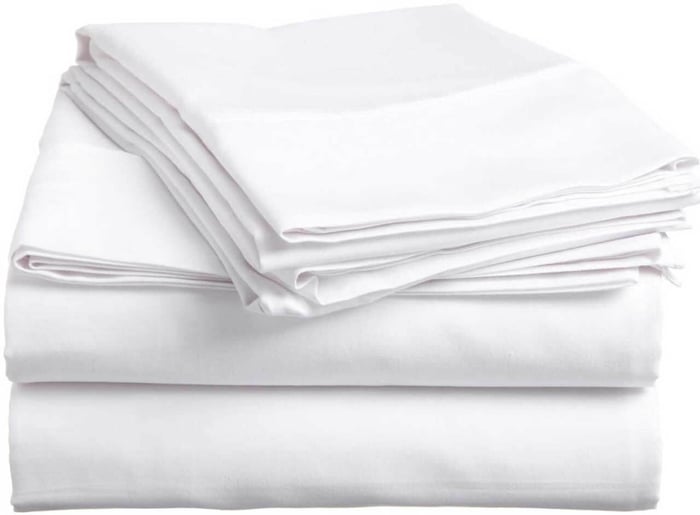Maintaining clean and pristine bed sheets will help you ensure a comfortable and inviting sleep environment. Proper care not only extends the lifespan of your sheets but also ensures optimal hygiene. In this blog post, we will provide you with some essential tips and tricks for keeping your bed sheets in excellent condition. From washing and drying to stain removal and storage, we've got you covered. So, join us as we delve into the world of bed sheet maintenance and discover the secrets to maintaining fresh, crisp, and inviting sheets.
How often should you wash your bed sheets?
The frequency at which you should wash your bed sheets is an important for maintaining cleanliness and comfort in your sleeping environment. As a general guideline, it is recommended to wash your bed sheets once every one to two weeks. However, individual factors such as personal hygiene, allergies, and the climate of your location may influence this recommendation. If you have allergies or respiratory issues, washing your sheets weekly can help minimize the buildup of allergens. Hot and humid climates may require more frequent washing to prevent the growth of bacteria or unpleasant odors. Additionally, if you or your guests sweat excessively during sleep or if there have been spills or accidents, it is essential to wash the sheets promptly. Regular washing not only removes dirt, sweat, and body oils but also helps maintain the freshness and longevity of your bedding. By adhering to a consistent washing schedule, you ensure a clean and inviting sleeping environment for yourself and your guests, promoting better sleep and overall well-being.
How often should you change your bed sheets?
Changing your bed sheets regularly is essential for maintaining cleanliness and ensuring a fresh and comfortable sleep environment. While the frequency of sheet changes may vary depending on personal preference and individual factors, a general recommendation is to change your bed sheets every one to two weeks. However, certain circumstances may require more frequent changes. If you sweat heavily during sleep, have allergies or skin sensitivities, or if you or your guests have been sick, it is advisable to change the sheets more frequently. Additionally, if there have been spills, stains, or any other forms of soiling, it's important to change the sheets promptly. Regular sheet changes help eliminate dirt, sweat, dead skin cells, and allergens, preventing the buildup of bacteria and odors. They also contribute to the overall freshness and hygiene of your bedding. By establishing a consistent routine of sheet changes, you create a clean and inviting sleeping environment that promotes better sleep quality and a healthier lifestyle.
What is the best way to launder your bed sheets?
Properly laundering your bed sheets is essential for maintaining their quality, cleanliness, and longevity. To achieve the best results, start by checking the care instructions provided by the manufacturer. In general, it is recommended to wash your sheets in cool or warm water, as hot water can cause shrinkage and damage certain fabrics. Use a mild detergent that is suitable for your sheets' material and avoid using bleach or harsh chemicals, as they can weaken the fibers. For heavily soiled sheets or those with stains, pretreating the affected areas before washing can help ensure thorough cleaning. When it comes to drying, tumble drying on a low or medium heat setting is typically the best option. Avoid over-drying, as it can lead to wrinkling and shrinkage. For natural fiber sheets, such as cotton, you may consider removing them from the dryer while they are still slightly damp to minimize wrinkling and make ironing easier if desired. Lastly, when storing your freshly laundered sheets, make sure they are completely dry to prevent the growth of mold or mildew. Folding them neatly and storing them in a clean, dry space will help maintain their freshness until the next use. By following these laundering tips, you can keep your bed sheets in top condition, ensuring a comfortable and hygienic sleep experience for you and your guests.
Should you use fabric softener on bed sheets?
When it comes to using fabric softener on bed sheets, opinions vary. While fabric softener can impart a pleasant scent and a soft feel to your sheets, it's worth considering a few factors before incorporating it into your laundering routine. Fabric softeners often contain chemicals that can leave a residue on the fabric, reducing the absorbency of towels and certain types of sheets. This can be particularly problematic for sheets made of natural fibers like cotton, as it may hinder their breathability. Additionally, fabric softeners can cause buildup over time, leading to decreased durability and increased pilling of the fabric. If you or your guests have sensitive skin or allergies, fabric softeners may potentially exacerbate these conditions. However, if you enjoy the added softness and fragrance that fabric softener provides, you can use it sparingly or opt for natural alternatives such as vinegar or baking soda, which can also help soften and freshen your sheets. Ultimately, the decision to use fabric softener on your bed sheets comes down to personal preference and the specific needs of your guests.
The best way to keep sheets in good condition
Keeping your sheets in good condition is key to ensuring their longevity and maintaining a comfortable sleep environment. Here are some essential tips to help you preserve the quality of your sheets. First and foremost, always follow the manufacturer's care instructions. This includes using the recommended water temperature, detergent, and drying settings. Avoid using harsh chemicals or bleach, as they can weaken the fibers and cause damage over time. To prevent pilling, wash your sheets separately from items with rough textures like towels or garments with zippers. It's also advisable to avoid overloading the washing machine, as this can lead to inadequate cleaning and excessive wear and tear. When it comes to drying, using a low to medium heat setting is generally best to prevent shrinkage and maintain the integrity of the fabric. If possible, line drying is an excellent option as it reduces the impact of heat on the sheets. Before storing, ensure that your sheets are completely dry to avoid mold or mildew growth. Fold them neatly and store them in a cool, dry place. Regularly rotating your sheets and using multiple sets will distribute wear more evenly. By following these tips and practicing proper care, you can extend the lifespan of your sheets, keeping them soft, fresh, and inviting for a restful night's sleep.
Caring for your bed sheets is not only about maintaining their cleanliness but also about ensuring a comfortable and inviting sleep environment. By following the right techniques and incorporating proper care into your routine, you can prolong the lifespan of your sheets and enhance their overall quality. From washing and drying to storage and maintenance, each step plays a crucial role in preserving the freshness and comfort of your bedding. Remember to check the care instructions provided by the manufacturer, use appropriate detergents, and avoid harsh chemicals that may damage the fibers.
Additionally, keep in mind factors such as water temperature, washing machine capacity, and drying settings to prevent shrinkage, pilling, and unnecessary wear and tear. Taking extra precautions, such as washing your sheets regularly, rotating multiple sets, and storing them properly, will contribute to their longevity and ensure a cozy sleep experience for you and your guests. By investing time and effort in caring for your bed sheets, you create a serene and comfortable oasis that promotes relaxation and rejuvenation. By adopting these best practices you’ll enjoy the benefits of fresh, clean, and luxurious sheets for years to come.
If you need assistance selecting the right bed sheets for your needs, contact Direct Textile Store 800.615.5822 or shop the wholesale bed sheet collection online.
About the Author
Haley Bridges, Marketing Assistant at Direct Textile Store
Haley Bridges has served as Marketing Assistant at Direct Textile Store, where she specializes in hospitality linens, uniforms, and bulk textile solutions. She works closely with hotels, restaurants, and healthcare facilities to match them with durable, high-quality products that balance both performance and value. Haley's expertise in textile sourcing and merchandising strategy helps businesses make confident purchasing decisions while staying ahead of industry trends.






